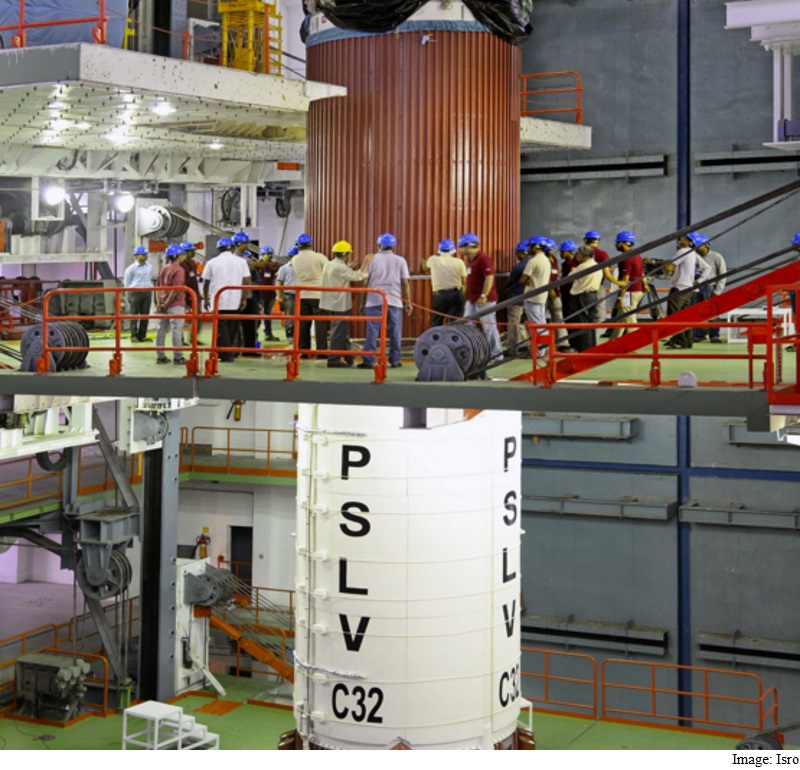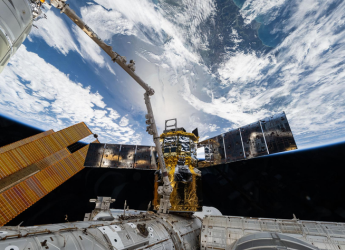- Home
- Science
- Science News
- Isro Says Countdown for Sixth Navigational Satellite Launch 'Progressing Normally'
Isro Says Countdown for Sixth Navigational Satellite Launch 'Progressing Normally'

The 54-and-half hour countdown began yesterday soon after the Mission Readiness Review Committee and Launch Authorisation Board cleared it and currently, it was "progressing normal", Isro officials said.
Polar Satellite Launch Vehicle-C32 on its 34th mission would launch the IRNSS-1F, aimed at providing navigation accurately on par with the US-based Global Positioning System, from the Satish Dhawan Space Centre at the spaceport of Sriharikota about 110 km from Chennai.
Indian Space Research Organisation to provide independent regional navigation satellite system on par with GPS, had launched five navigation satellites under the Indian Regional Navigation Satellite System (IRNSS).
While four satellites would be sufficient to start operations of the IRNSS system, the remaining three would make it more "accurate and efficient", an Isro official said.
"With the launch of four satellites, we were able to provide navigation for 18 hours. But after fifth launch we increased the capacity to 24 hours with an accuracy of 20 metres. The sixth IRNSS-1F and seventh launch (IRNSS-1G) will be accurate and more efficient," an Isro official told PTI.
The five satellites already launched are IRNSS-1A on July 1, 2013, IRNSS-1B on April 4, 2014, IRNSS-1C on October 16, 2014, IRNSS-1D on March 28, 2015 and IRNSS-1E on January 20, 2016.
Isro scientists plan to put all seven navigation satellites into orbit by March 2016. The last in the series is expected to be launched by month end.
For the IRNSS-1F launch, scientists have used the "XL" variant used in previous launches of IRNSS satellites, given its capacity to carry load.
Similar occasions where rocket with XL configuration were used were during launch of Chandrayaan-1, Mars Orbiter Mission, ASTROSAT besides the five IRNSS satellites.
Along with the navigation payload and ranging payload, the satellite also carries a "highly accurate Rubidium atomic clock" with it. The payload will transmit navigation service signals to the users.
The 44.4 metre tall IRNSS-1F has a liftoff mass of 1,425 kg and would be launched in sub-Geosynchronous Transfer Orbit (sub GTO). It has a 12 year mission life.
For details of the latest launches and news from Samsung, Xiaomi, Realme, OnePlus, Oppo and other companies at the Mobile World Congress in Barcelona, visit our MWC 2026 hub.
Related Stories
- Samsung Galaxy Unpacked 2026
- iPhone 17 Pro Max
- ChatGPT
- iOS 26
- Laptop Under 50000
- Smartwatch Under 10000
- Apple Vision Pro
- Oneplus 12
- OnePlus Nord CE 3 Lite 5G
- iPhone 13
- Xiaomi 14 Pro
- Oppo Find N3
- Tecno Spark Go (2023)
- Realme V30
- Best Phones Under 25000
- Samsung Galaxy S24 Series
- Cryptocurrency
- iQoo 12
- Samsung Galaxy S24 Ultra
- Giottus
- Samsung Galaxy Z Flip 5
- Apple 'Scary Fast'
- Housefull 5
- GoPro Hero 12 Black Review
- Invincible Season 2
- JioGlass
- HD Ready TV
- Latest Mobile Phones
- Compare Phones
- Nothing Phone 4a Pro
- Infinix Note 60 Ultra
- Nothing Phone 4a
- Honor 600 Lite
- Nubia Neo 5 GT
- Realme Narzo Power 5G
- Vivo X300 FE
- Tecno Pop X
- MacBook Neo
- MacBook Pro 16-Inch (M5 Max, 2026)
- Tecno Megapad 2
- Apple iPad Air 13-Inch (2026) Wi-Fi + Cellular
- Tecno Watch GT 1S
- Huawei Watch GT Runner 2
- Xiaomi QLED TV X Pro 75
- Haier H5E Series
- Asus ROG Ally
- Nintendo Switch Lite
- Haier 1.6 Ton 5 Star Inverter Split AC (HSU19G-MZAID5BN-INV)
- Haier 1.6 Ton 5 Star Inverter Split AC (HSU19G-MZAIM5BN-INV)

















